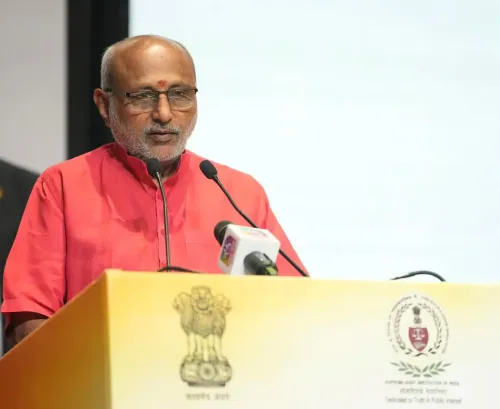Did the ED Really Seize Rs 22 Lakh from a Punjab Engineering Firm Over Illegal Deals in Syria and Turkey?

Synopsis
Key Takeaways
- ED seized Rs 22 lakh from Punjab engineering firm.
- Payments received through unauthorized channels.
- Investigations linked to exports to Syria, Iran, Turkey, and Colombia.
- Firm faces action under FEMA, 1999.
- Evidence of cash transactions both domestically and internationally.
Jalandhar, Nov 16 (NationPress) – An amount of Rs 22 lakh was confiscated by the ED during raids at four sites belonging to an engineering goods export firm in Phagwara, Punjab. This seizure was linked to the company's transactions involving unauthorized payment channels for goods exported to Syria, Iran, Turkey, and Colombia, according to an official statement released on Sunday.
The Directorate of Enforcement (ED), Jalandhar Zonal Office, executed search operations on Friday targeting the Opal Engineering Corporation (OEC), a company engaged in exporting engineering goods.
During the operations, the ED recovered and confiscated Rs 22 lakh in cash, as well as incriminating documents and electronic evidence.
Evidence was also gathered indicating that some export transactions were conducted in cash both domestically and internationally.
The firm faces repercussions for violating the provisions of the Foreign Exchange Management Act (FEMA), 1999, due to payments received from unrelated third parties without adhering to proper procedures.
Investigations by the ED revealed that while the company exported goods to nations like Syria, Iran, Turkey, and Colombia, the proceeds from these exports were not realized in accordance with FEMA, 1999 and RBI guidelines.
Payments were instead adjusted against transfers from unrelated entities through various channels, including personal accounts, as per the ED's findings.
Notably, there were no tri-partite agreements or valid documentation to support these adjustments, with the firm allegedly using a forged Customs email to validate the transactions.
In a related case, the ED seized an additional Rs 70 lakh in cash and froze 110 mule bank accounts during simultaneous searches at five locations in Delhi-NCR and Jaipur. This investigation is tied to a narcotics trafficking and online betting network that utilized cryptocurrency wallets based in Dubai for money transfers, according to an official statement.
The Directorate of Enforcement (ED), Delhi Zonal Office, conducted these searches under the Prevention of Money Laundering Act (PMLA), 2002, on Friday, as stated by the official.
This case is linked to the seizure of 82.53 kilograms of cocaine by the Narcotics Control Bureau (NCB) in November 2024, which prompted the registration of Complaint No. 36/2024 against various individuals and entities involved in a global drug trafficking network.









